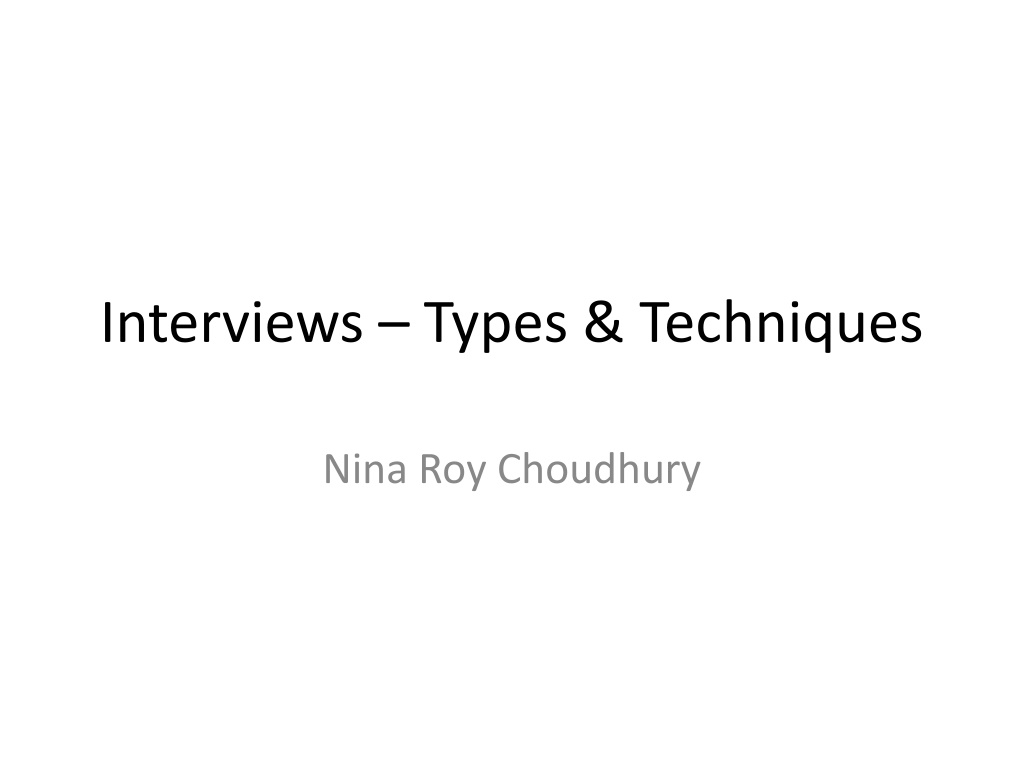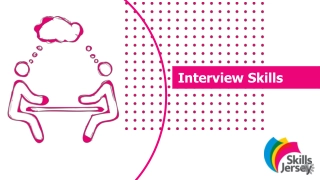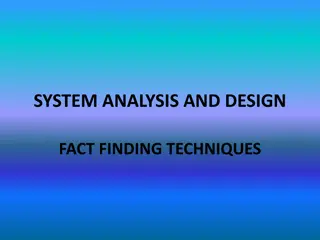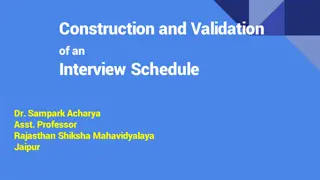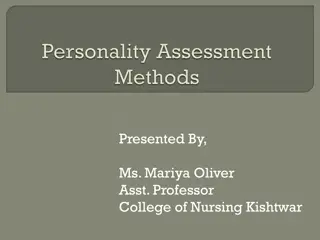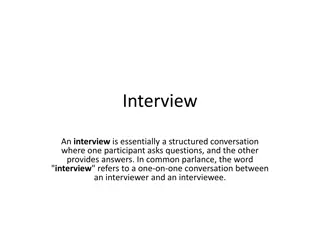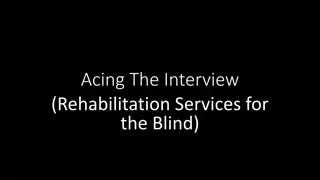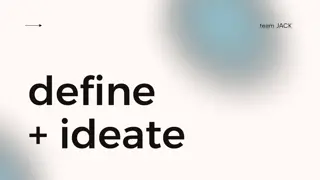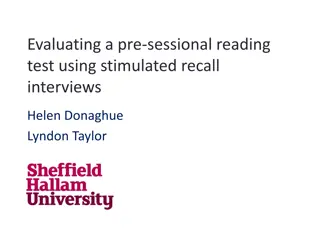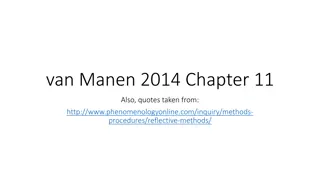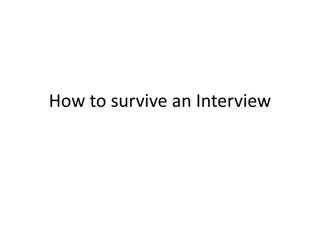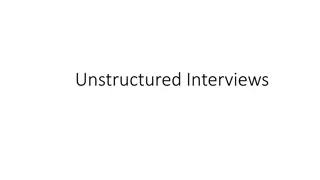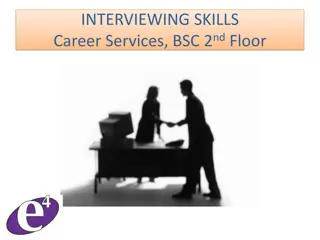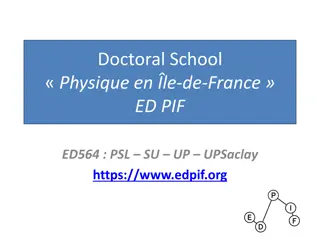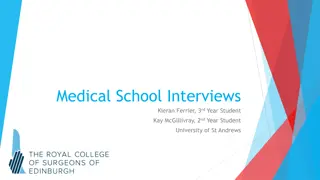Effective Group Discussion Techniques for Successful Screening
Group discussions (GD) play a crucial role in screening and evaluation processes for selection purposes. They simulate real-life work situations and help in identifying team players and skilled communicators. GD evaluations focus on various aspects such as communication skills, leadership qualities, and analytical thinking. Participants are encouraged to be well-informed, practice active listening, respect diverse viewpoints, and improve their reasoning and English speaking skills. Remember, GD is about discussion, not debate.
- Group Discussion Techniques
- Screening Process
- Communication Skills
- Team Evaluation
- Interview Preparation
Download Presentation

Please find below an Image/Link to download the presentation.
The content on the website is provided AS IS for your information and personal use only. It may not be sold, licensed, or shared on other websites without obtaining consent from the author. Download presentation by click this link. If you encounter any issues during the download, it is possible that the publisher has removed the file from their server.
E N D
Presentation Transcript
Interviews Types & Techniques Nina Roy Choudhury
Interviews are examples of two way communication through dialogue and personal interaction This interaction is important for selection purpose. Interviews are part of the screening process. Screening involves : Advertisement, Application and biodata, Group Discussion and Interviews. Organizations conduct screening and routine interviews- preliminary, final, assessment,reprimand, grievance etc.,
Group Discussion GD is a preferred means of screening and evaluation It simulates real life work place situations Helps to select good team players Helps select skillful group communicators GD is conducted before selection interviews It tests communication skills, group behaviour, IQ, GK and listening skills of candidates.
Conduct of GD A group of 10-12 persons is formed Topic for discussion is either given or chosen by the group Topics may be factual or abstract- current events, politics, sports, culture etc., Discussion is limited to 20-30 minutes Topics may be given on the spot or a little before the GD
Evaluation at the GD You will be evaluated on: Poise, appearance and body language Self-confidence and assertiveness Listening skills Communication skills Leadership skills Role and group behaviour Analytical and reasoning skills Time management
You will be penalized for: Aggressive, domineering behaviour Losing your temper Impatience Showing bias and prejudice Being irrelevant Poor listening skills Non-participation
Participation for GD involves: Being well informed and knowledgeable Practising active and reflexive listening Respecting and appreciating different points of view Developing logical reasoning skills Practising English speaking skills Practising voice modulation
GD is a discussion not a debate Do not be one sided or have extreme views and opinions Discuss the topic from all points of view Be brief and to the point Present views in a logical and rational manner Be polite and respectful Summarize and try to arrive at a conclusion
Preparation for Interviews An employment interview is a meeting between two or more people- employer/s and applicant It is the first meeting for both with a view to get to know each other The employer s aim is to find out the candidate s suitability and usefulness to the company The applicant s aim is to find out if the company is suitable for him/her A successful outcome is when both employer and applicant are satisfied that they have made the right choice.
Interviewers Role and Preparation Know your applicant. Study the resume in advance. Use resume to probe deeper. Ensure privacy and interruption free session. Mobiles should be switched off. Allow enough time for the interview. Do not rush through it. Give interviewee time to answer as well as ask questions. Don t waste time. Keep control over the interview by preventing unnecessary discussions. Be familiar with the post/job and its requirements to be able to test the applicant s suitability.
Be clear about the type and amount of knowledge/information needed to come to a decision. Receive the candidates cheerfully. Put them at ease. Ask open ended questions. Aim to find out how much the candidate knows and not what he doesn t know. Be a good listener. Look for non verbal messages. Pay attention to the close of the interview. Concentrate throughout. At the end thank the candidate giving details of declaration of results.
Interviewees preparation Learn about the post, nature of the job, company, its products. Scrutinize the advertisement. Speak to people with experience in that post/company. Learn about the company from different sources. Anticipate questions and prepare your answers. Questions will be related to the post, your resume, training and experience. Be present well in time. Be neat, tidy and well groomed. Dress modestly and in sober colours. Appear presentable and businesslike. Be cheerful and confident. Be interested in the job and the company. Don t be anxious about the interview. Wish the interviewer/s. Do not interrupt. Listen carefully. Speak when you are supposed to.
Answer questions frankly and honestly. Do not bluff. Be audible. Speak in a clear and pleasant tone. Look at the interviewer. Be enthusiastic but do not argue. Disagree politely if you have to. Leave when you are asked to. Thank the interviewer. You may ask about the results. Maintain a positive attitude and inspire trust and confidence through your speech and conduct.
Interviewers Preferences Likes: Candidates who are punctual, polite, speak distinctly, shake hands firmly, are quietly confident and good listeners, who speak neither too much nor too little, have a good posture, cheerful, straightforward, sincere, enthusiastic, with a sense of humour. Dislikes: Those who are boastful, with a superiority/inferiority complex, too opinionated, dominating, nitpicking, critical, do not give enough information, too hearty, too timid, fidgety.
Types of Interviews Interviews are categorized as DIRECTIONAL and NON DIRECTIONAL Directional Interview : Objective, purpose and outcome of interview is known to interviewer/interviewee Official and formal Selection, reprimand, appraisal and assessment interviews
Types of Interviews Non Directional Interview Objective and outcome is not clearly defined. Aim is to improve human relations, build co operation and goodwill. No fixed and rigid structure Grievance, exit interviews
One-one Interview Traditional format Single interviewer and single interviewee May be biased or prejudiced But useful for personal counselling Counselling, grievance,reprimand, exit interviews
Panel Interview Many interviewers and single interviewee Interviewers are specialists/experts Combination of age and experience Candidate can be tested from different angles Comprehensive Neutralizes bias and prejudice
WASP All interviews follow the WASP method. W : Welcome A :Acquiring information Information about the candidate Information about the organization S : Supplying Information Information about the job, organization, terms and conditions of service Information about qualifications, training, experience, aptitude, etc P : Parting Thanking each other, bidding goodbye
Interviews in Organizations Employment/Selection Interview Primary Objective: To select the best candidate for the job Secondary Objectives: To obtain first hand information about: Qualifications, aptitude, attitude To provide essential facts about the job and the company To create mutual understanding between the company and the applicant To generate goodwill towards the company Employment interviews may be on-one, panel interviews Formal and official
Assessment/ Appraisal Interview Primary objective: To review performance of employees/deptts Secondary Objectives: To discuss tasks, responsibilities, achievements of employees To discuss growth plans To improve job performance To obtain feedback To improve human relations Appraisal interviews are held at least at least once a year.
Appraisal Interview A successful Appraisal interview is one where: The senior knows the subordinate s responsibilities Subordinates can express themselves freely Relevant work behaviour and achievements Interviews are on a regular basis Proper training is given to all employees
Grievance Interview Primary objective: To get an insight /clarifications on problems of employees Secondary objectives To obtain feedback through complaints and grievances To allow employees to vent their feelings/emotions To take corrective action
Grievance Interview Final objective To create harmony To integrate employee s goals with org s goal Interviewer s Role: Be a good listener Allow interviewer to speak freely Be tactful Inspire trust and confidence
Exit Interview Primary Objective To generate goodwill between employer and employee Secondary Objectives To collect feedback To survey employee attitudes to the company Characteristics Held after an employee resigns Effective means of internal PR
Evaluation and Assesment Organizations have standard evaluation, assessment sheets/formats These formats given to interviewers Evaluation is divided into Form and Content Form: Candidate s manner, attitude examined/rated Eg: confident, relaxed, composed, alert . Critical, rigid .
Evaluation and Assessment Content: Evaluation of knowledge base, GK, presentation skills, experience Method: Rating/evaluation maybe done in points/marks/grades or Outstanding/good/fair/poor Rating not to be done in presence of candidate, immediately after he/she leaves room Rating to be done independently of other panel members.
